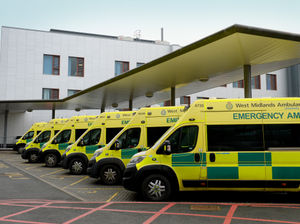Patients 'at risk' from record ambulance delays with some dying while waiting for help
Patients are "at risk" from record ambulance delays, paramedics have said, as average waiting times for callouts to potentially serious conditions are twice the national standard.

Figures from NHS England show the mean response time to Category 2 calls, which include stroke and other emergencies, was more than 45 minutes in September, compared with a target average of 18 minutes.
The statistics, which were released in October, also show that response times for all categories are the longest since data was first collected in England in April 2018.
In the West Midlands specifically, hospital handover delays have shot up dramatically. In 2020 hours lost due to delays in waits of more than 15 minutes peaked at 1,200 in total across the month of December – but in September 2021 the figure was close to 30,000 hours – more than double it had been in the worst month the year previous.
The West Midlands Ambulance Service (WMAS) board of directors heard at the end of last month that the amount of time being lost to delays had reached previously unseen levels.
The knock-on effect is that ambulances are not available to respond as quickly to people in need of urgent medical care, which has led to cases of patients dying while waiting for an ambulance.
As a result, the board has taken the unprecedented step of moving handover delays to ‘risk rating 25′ – the highest possible level of risk. It is the first time any risk has been categorised as '25' in the history of WMAS.
There have been problems elsewhere in the UK as well, with the Scottish Police Federation saying officers have driven patients to hospital, and the military brought in to ease strain on the system in Wales.
Figures also show targets are being missed for the most serious - or Category 1 - calls, with the standard of an average of seven minutes missed, with an average response time in England of nine minutes and one second in September.
Richard Webber, of the College of Paramedics and a working paramedic, said that his colleagues "have never before experienced anything like this at this time of the year".
He added: "Every day services are holding hundreds of 999 calls with no-one to send.
"The ambulance service is simply not providing the levels of service they should - patients are waiting too long and that is putting them at risk."
Last month, ambulance leaders described the "highest level of emergency activity in history" and raised concerns about the time lost to hospital handover delays.
Martin Flaherty, managing director of the Association of Ambulance Chief Executives (AACE), said the hours lost due to delays in waits of more than 60 minutes rose nearly 650 per cent in six months, from 4,700 in April to 35,000 in September.
He said: "AACE remains extremely concerned about the unprecedented levels of hospital handover delays which are occurring across the UK.
"These have increased significantly since April, resulting in long waits for patients to be admitted to ED and a reduction in our ability to respond to patients in the community.
"These delays are in part due to the need to maintain social distancing in EDs alongside the unprecedented pressures in the whole urgent and emergency care system at present.
"We are especially concerned about the numbers of delays of over 60 minutes, which is where we believe most of the harm associated with these delays occurs."
It came as a poll for the NHS Confederation found that health leaders believe the pressure on the NHS is now at unsustainable levels and patient safety and care are being put at risk by staff shortages."




